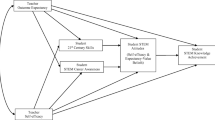Abstract
The proliferation of telehealth has provided a means to extend and supplement traditional face-to-face approaches for the provision of psychological care. To develop true competency in the use of telehealth modalities, one must ensure focused education related to both general knowledge and hands-on skills. Despite several post-doctoral continuing education programs having emerged, a growing number of psychological professionals have suggested the utility of telehealth-focused education in doctoral-level graduate programs for psychology students. While graduate-level education holds many potential benefits, including providing a foundation for future telehealth usage and creating a means to address ongoing mental health disparities, such training programs have been minimally discussed in the literature, with no formal model disseminated. As such, the current discussion sought to support program development by briefly outlining a proposed model for doctoral-level graduate education for psychology students. Competencies, initial and advanced coursework, direct application, supervision, and program evaluation are discussed.
Similar content being viewed by others
References
Babione, J. M. (2010). Evidence-based practice in psychology: an ethical framework for graduate education, clinical training, and maintaining professional competence. Ethics & Behavior, 20(6), 443–453. https://doi.org/10.1080/10508422.2010.521446
Campbell, L. F., Millan, F., & Martin, J. N. (2018). A telepsychology casebook: using technology ethically and effectively in your professional practice. American Psychological Association.
Clark, G. (2016). Traditional uses of technology in counseling education and supervision. In S. Gross, K. Anthony, L. S. Stretch & D. M. Nagel (Eds.), Technology in mental health: applications in practice, supervision, and training (2nd ed., pp. 260–271). Charles C Thomas.
Cook, J. M., Schnurr, P. P., Biyanova, T., & Coyne, J. C. (2009). Apples don’t fall far from the tree: Influences on psychotherapists’ adoption and sustained use of new therapies. Psychiatric Services, 60(5), 671–676. https://doi.org/10.1176/appi.ps.60.5.671
Galpin, K., Sikka, N., King, S. L., Horvath, K. A., Shipman, S. A., & AAMC Telehealth Advisory Committee. (2020). Expert consensus: Telehealth skills for health care professionals. Advance online publication. https://doi.org/10.1089/tmj.2020.0420
Glueckauf, R. L., Maheu, M. M., Drude, K. P., Wells, B. A., Wang, Y., Gustafson, D. J., & Nelson, E. -L. (2018). Survey of psychologists’ telebehavioral health practices: technology use, ethical issues, and training needs. Professional Psychology: Research and Practice, 49(3), 205–219. https://doi.org/10.1037/pro0000188
Goss, S., Anthony, K., Stretch, L. S., & Nagel, D. M. (2016). Technology in mental health: applications in practice, supervision, and training –. (2nd ed.). Charles C. Thomas Publisher LTD.
Griswold-Theodorson, S., Ponnuru, S., Dong, C., Szyld, D., Reed, T., & McGaghie, W. C. (2015). Beyond the simulation laboratory: a realist synthesis review of clinical outcomes of simulation-based mastery learning. Academic Medicine, 90(11), 1553–1560. https://doi.org/10.1097/ACM.0000000000000938
Health Resources and Services Administration. (2021). Telehealth programs. https://www.hrsa.gov/rural-health/telehealth
Langarizadeh, M., Tabatabaei, M. S., Tavakol, K., Naghipour, M., Rostami, A., & Moghbeli, F. (2017). Telemental health care, an effective alternative to conventional mental care: a systematic review. Acta Informatica Medica, 25(4), 240–246. https://doi.org/10.5455/aim.2017.25.240-246
Maheu, M. M., Drude, K. P., Hertlein, K. M., Lipschutz, R., Wall, K., & Hilty, D. M. (2018). Correction to: An interprofessional framework for telebehavioral health competencies. Journal of Technology in Behavioral Science, 3(2), 108–140. https://doi.org/10.1007/s41347-018-0046-6
Maheu, M. M., Drude, K. P., Merrill, C. A., Callan, J. E., & Hilty, D. M. (2020). Telebehavioral health: foundation in theory and practice for graduate learners. Cognella Academic Publishing.
Maheu, M. M., Whitten, P., & Allen, A. (2001). e-Health, telehealth, and telemedicine: A guide to start-up and success. Jossey-Bass.
McCord, C. E., Console, K., Jackson, K., Palmiere, D., Stickley, M., Williamson, M. L. C., & Armstrong, T. W. (2020a). Telepsychology training in a public health crisis: a case example. Counselling Psychology Quarterly. Advance online publication. https://doi.org/10.1080/09515070.2020.1782842
McCord, C., Bernhard, P., Walsh, M., Rosner, C., & Console, K. (2020b). A consolidated model for telepsychology practice. Journal of Clinical Psychology, 76(6), 1060–1082. https://doi.org/10.1002/jclp.22954
Myers, K., & Turvey, C. L. (Eds.) (2013). Telemental health: clinical, technical, and administrative foundations for evidence-based practice. Elsevier.
Perle, J. G. (2020). Introduction to telehealth for clinical psychologists: a novel course designed to improve general knowledge and hands-on expertise with technology-based modalities. Journal of Technology in Behavioral Science. Advance online publication. https://doi.org/10.1007/s41347-020-00147-6
Perle, J. G. (2021). A mental health provider’s guide to telehealth: providing outpatient videoconferencing services. Routledge.
Traube, D. E., Cederbaum, J. A., Taylor, A., Naish, L., & Rau, A. (2020). Telehealth training and provider experience of delivering behavioral health services. The Journal of Behavioral Health Services & Research. Advance Online Publication. https://doi.org/10.1007/s11414-020-09718-0
Tuerk. P. W., & Shore, P. (Eds.). (2015). Clinical videoconferencing in telehealth: program development and practice. Springer International.
Zhou, X., Snoswell, C. L., Harding, L. E., Bambling, M., Edirippulige, S., Bai, X., & Smith, A. C. (2020). The role of telehealth in reducing the mental health burden from COVID-19. Telemedicine and e-Health, 26(4), 377–379. https://doi.org/10.1089/tmj.2020.0068
Author information
Authors and Affiliations
Corresponding author
Ethics declarations
Competing Interests
The author declares no competing interests.
Additional information
Publisher's Note
Springer Nature remains neutral with regard to jurisdictional claims in published maps and institutional affiliations.
Rights and permissions
About this article
Cite this article
Perle, J.G. Training Psychology Students for Telehealth: a Model for Doctoral-Level Education. J. technol. behav. sci. 6, 456–459 (2021). https://doi.org/10.1007/s41347-021-00212-8
Received:
Revised:
Accepted:
Published:
Issue Date:
DOI: https://doi.org/10.1007/s41347-021-00212-8




